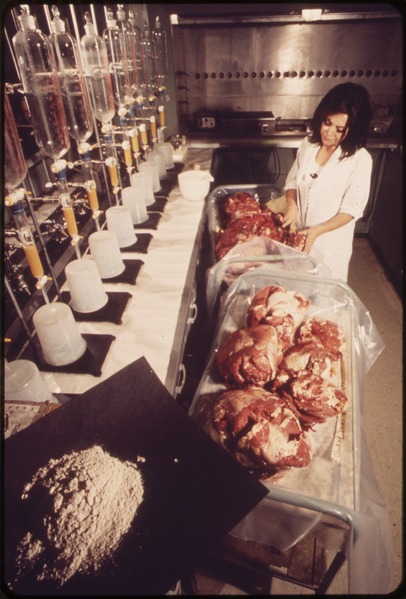I’m vegetarian and would pass on eating even lab-grown meat, but I do hope we perfect the process soon. Certainly for the sake of animals and for our good as well, since a large percentage of the environmental damage we cause comes from meat production, and more and more corners of the globalized world are refusing to go without meat and cursing the bread. The opening of Larry Schwartz’s Frankenfood feature at Salon:
“It was just over a year ago that the world’s first laboratory-grown hamburger was introduced to the world. The in-vitro meat (aka test tube meat, cultured meat, cruelty-free meat, and my favorite, ‘shmeat’) took four years to grow from cow stem cells and cost a meaty $332,000. Cultured in-vitro meat—or ‘frankenburger,’ as the press dubbed it—is the brainchild of a Dutch biologist, Mark Post, of the University of Maastricht. The single burger, created from 20,000 strands of muscle tissue grown in petri dishes, got some lukewarm reviews.
‘It wasn’t unpleasant,’ Chicago food writer Josh Schonwald wrote. More enthusiastically, food researcher Hanni Rutzler commented, ‘That’s some intense flavor.’ Because the meat was cultured from muscle with no fat cells, it lacked juiciness, and was reminiscent of an overdone dry turkey burger. Still, the consensus was that it tasted better than expected, had the consistency of real meat, and for a first try, was not discouraging. Post told NBC News, ‘I’m very excited. It took a long time to get this far. I think this is a very good start.’
While anyone who has seen videos of the horrific conditions factory-farmed cows, pigs and chickens endure in their short, tortured lives might agree that in-vitro meat is a good idea, there’s an even more pressing reason to figure out a way to grow meat: the production of meat on planet Earth is killing us. It takes up more than half of our agricultural capacity, and as the economies of China and other developing nations grow, and as their citizens demand more meat on their dinner tables, that capacity will be strained even further.”
Tags: Josh Schonwald, Larry Schwartz, Mark Post

